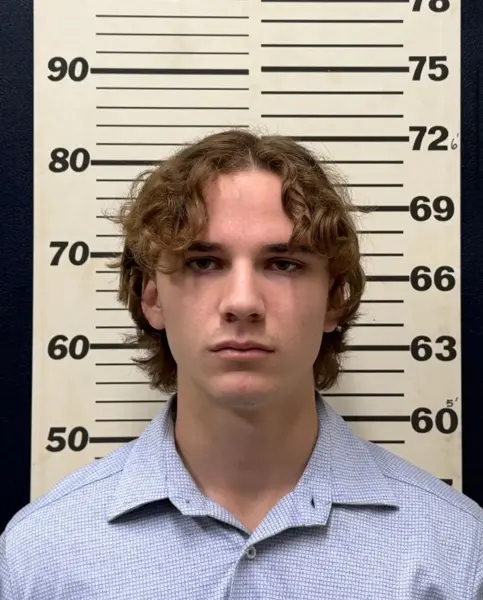Barstool Sports’ Dave Portnoy Releases Shocking Video of Mississippi Student Smirking After Hurling Vile Antisemitic Slur During Pizza Review
Barstool Sports founder Dave Portnoy has never shied away from confrontation — but even for him, what happened on the streets of Starkville, Mississippi last week crossed a line that stunned millions online. The outspoken media personality, known for his unapologetic humor and viral pizza review series, was filming one of his trademark one-bite videos outside a local restaurant when a young man suddenly launched into a hateful outburst, shouting antisemitic slurs in public.

Within hours, Portnoy released the footage himself, posting the moment across social media platforms to shed light on the disturbing encounter. The video shows the student, later identified by police as 20-year-old Patrick McClintock, walking past Portnoy before turning back and unleashing a vile antisemitic insult. When confronted, McClintock is seen smirking — a reaction that quickly fueled outrage nationwide.
The clip opens like any other of Portnoy’s pizza reviews, a franchise that has turned the Barstool founder into a recognizable street presence in dozens of American cities. Dressed casually in his usual ballcap and button-up shirt, he greets viewers, gives the restaurant a quick introduction, and begins to sample a slice for the camera. But the tone shifts abruptly when the heckler’s voice interrupts from off-screen, spewing hate-filled language that shocks both Portnoy and those nearby.

In the uncut video posted on X (formerly Twitter), Portnoy immediately turns toward the man and calls him out. “What did you just say?” he asks, visibly taken aback. McClintock, wearing a gray sweatshirt and holding a phone, is seen grinning as he repeats part of his slur before turning away. “Did you just say that? Are you kidding me?” Portnoy says again, his tone rising in disbelief. The man keeps walking but continues to smirk — a reaction that, to many, seemed almost performative, as if he wanted the confrontation to escalate for attention.
For Portnoy, who has built a career around raw, unfiltered authenticity, the incident was not just another viral clip — it was something far darker. Within minutes of the encounter, he posted the footage online with a clear caption: “This is the face of hate.” The video racked up millions of views within 24 hours, drawing reactions from across the political and entertainment spectrum.

The Starkville Police Department soon confirmed that they had identified the suspect as Patrick McClintock, a student at Mississippi State University. Officers later released a booking photo after McClintock was charged with disturbing the peace. The university also issued a statement condemning the act, calling the student’s language “deeply offensive, unacceptable, and inconsistent with our values.”
“This was not just a dumb outburst,” one MSU faculty member told local reporters. “This was a deliberate, hateful act in broad daylight, targeting someone for their heritage. It’s exactly the kind of behavior we cannot allow to go unchecked.”
Public reaction to the video has been swift and divided — not over whether the slur was reprehensible, but over how Portnoy handled it. Many praised him for calling out antisemitism directly rather than ignoring it. Others questioned whether amplifying the student’s identity online would make the situation worse. Portnoy, however, stood firm.
“I’m not going to hide this stuff,” he said in a follow-up post. “You can’t combat hate by pretending it doesn’t exist. This kid thought it was funny — I wanted people to see that face and understand what we’re dealing with.”
For many viewers, the clip became part of a larger conversation about how antisemitism — often dismissed as a relic of the past — continues to manifest in everyday spaces, from college campuses to social media. The timing of the incident also struck a nerve, coming amid a rise in antisemitic incidents reported across the United States in recent years.
According to the Anti-Defamation League (ADL), 2024 saw one of the sharpest increases in antisemitic harassment and vandalism in more than a decade. “These moments remind us that hate speech is not abstract,” said Jonathan Greenblatt, CEO of the ADL. “It’s real, it’s pervasive, and it’s emboldened by a culture that often downplays or excuses prejudice under the guise of ‘free speech.’”
In the days following the video’s release, Barstool Sports’ fanbase — one of the most active online communities in digital media — rallied around Portnoy. Many commenters flooded McClintock’s now-deleted social media accounts, demanding accountability and tagging Mississippi State University to take disciplinary action. Within 48 hours, the university confirmed that the student had been suspended pending investigation.
While Portnoy is no stranger to controversy, his decision to publicly expose the encounter has been widely supported, even among his critics. Many noted that his reaction was measured — he did not escalate the situation physically, nor did he engage in a shouting match. Instead, he documented it, shared it, and let the evidence speak for itself. “You can’t fake that kind of reaction,” wrote one Barstool fan on X. “The guy was calm, called it out, and let the internet handle the rest.”
Still, Portnoy acknowledged that the video’s virality came with heavy emotions. “You never think something like this will happen in the middle of a small-town pizza review,” he said during a later livestream. “I’ve heard a lot of crazy stuff over the years — people heckling, joking, whatever. But this was different. This was hate.”
The episode has reignited debate over where the line lies between public exposure and online humiliation. While McClintock’s actions were undeniably offensive, legal experts note that viral outrage can quickly transform into digital mob justice. “It’s a delicate balance,” said media attorney Ben Travers. “On one hand, documenting hate is important for awareness. On the other, the internet has a tendency to overcorrect — sometimes in ways that can escalate beyond accountability into destruction.”
Yet, as Travers also pointed out, the student’s demeanor in the video — smirking after using a racial and religious slur — made it difficult for the public to sympathize. “There’s a difference between an offhand mistake and a moment of deliberate hate,” he said. “What we saw here was intentional provocation.”
Mississippi State University has faced pressure from advocacy groups and alumni to take firm disciplinary action. Some Jewish student organizations across the South have also voiced solidarity with Portnoy and condemned the behavior as part of a broader cultural problem. “We stand with those who call out antisemitism, wherever it appears,” said a spokesperson for Hillel International. “Universities must ensure that campuses remain places of safety and respect, not intimidation.”
Meanwhile, Portnoy has continued his pizza review tour but says the experience won’t leave his mind anytime soon. “It sticks with you,” he admitted. “When someone says something like that to your face, you realize how deep this stuff still runs. It’s not about me — it’s about what it represents.”
In a follow-up post on Barstool Sports’ website, he elaborated further: “Antisemitism is not just about one word or one guy yelling on the street. It’s about a mindset that thinks it’s okay to hate people because of who they are. That’s what’s dangerous — the casualness of it. The smirk afterward.”
As the video continues to circulate online, reactions have expanded beyond the Barstool community. Even individuals outside of sports media have weighed in, calling the moment a reminder that public figures — for better or worse — often become the targets of misplaced hostility. But Portnoy’s choice to share the clip may have turned that moment of hate into an opportunity for broader reflection.
“This wasn’t just a video about pizza,” wrote one user on X. “It’s a snapshot of where we are as a society — how quick some people are to hate, and how important it is to confront it when it happens.”
McClintock’s legal process is still ongoing, and police have not yet announced whether further charges will be pursued. Mississippi State University has not commented beyond its initial statement, citing privacy laws regarding student disciplinary matters.
For Portnoy, the takeaway seems clear. He has since thanked his followers for the outpouring of support but has emphasized that the real focus should be on the message, not the man behind the camera. “I don’t care about being the story,” he said. “I care about people seeing what hate looks like — and understanding that it’s real.”
The viral video may have started as another stop on Portnoy’s pizza tour, but it has since evolved into something much bigger: a confrontation with one of humanity’s oldest and ugliest prejudices, captured in real time. In the end, Portnoy didn’t just film a pizza review that day — he filmed a mirror of modern America, where a casual street insult exposed the depth of division still lingering in everyday life.


